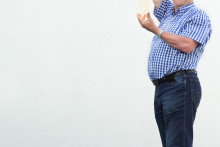‘A plane crashes and everybody blames the pilot.’ PhD candidate Willy Siegel recalls the Turkish Airline crash near Schiphol in 2009. ‘But it soon appeared that there were problems with the altimeter that the crew noticed too late. How great would it be to know things earlier, to prevent such accidents from happening?’
Willy believes that people are able to learn how to identify weak spots in complex technological systems. When they do, people can take appropriate action to avoid error. ‘Consider it as a learning curve. When you systematically look at identified stress factors on a daily basis, there are techniques to recognize the so called weak resilience signals,’ the researcher states.
At the same time, Willy is aware that emergencies happen no matter how careful the preparation. Look at the Challenger space shuttle or train catastrophes. ‘It’s not realistic to try and find all mistakes. Instead, the human machine interaction should function in such a way, that people receive all information they need to cope with the situation.’ Willy suggest to resemble a palm tree: ‘Companies enforce all kinds of procedures, like a rigid tree. But if the wind blows hard enough, it will break. Palm trees, on the other hand, have the capacity to bend and survive the toughest storms.’ According to the aerospace engineer, making people and technology resilient is the best approach to maximise performance in the safest way, with a reasonable work load.
Keeping promises
While working as a consultant for ProRail, Willy wanted to find a way how to put humans in a more central position in technological safety measures. ProRail agreed to team up with The Netherlands Organisation for Scientific Research (NWO), to finance an academic research in this area. Willy was put in the team to formulate the questions. At that point, his enthusiasm could not be curbed. Willy: ‘The topic was so appealing to me, that I didn’t want anybody else to do the research. I wanted to do it myself!’
Doing a PhD is fulfilling a promise he made himself years ago. ‘I lived in Israel until after I got married and had children. I took my family to The Netherlands to do a PhD here. But at the time, we faced such difficulty maintaining the family that I had to quit and find a decent job. Doing a PhD now, after all those years, feels really good.’
Israeli Airforce
Even though Willy’s life took some unforeseen turns, his activities did always relate to safety in one way or another. Although he was born in The Netherlands, his Jewish family moved to Israel, where he spent his youth. As he was the best student of his middle school, he was allowed to do a bachelor in aerononautical engineering before serving in the Airforce. This foundation helped him in his work. ‘I developed avionics software that wasn’t found anywhere else in the world. Many of them concerned communications with F16’s and enabling them to eliminate objects with chirurgical precision.’
Throughout his life, Willy’s activities stem from a morale and ideology to keep people safe. Which can’t be done by technology alone, but needs human competence. Willy: ‘And I get to contribute to it.’







